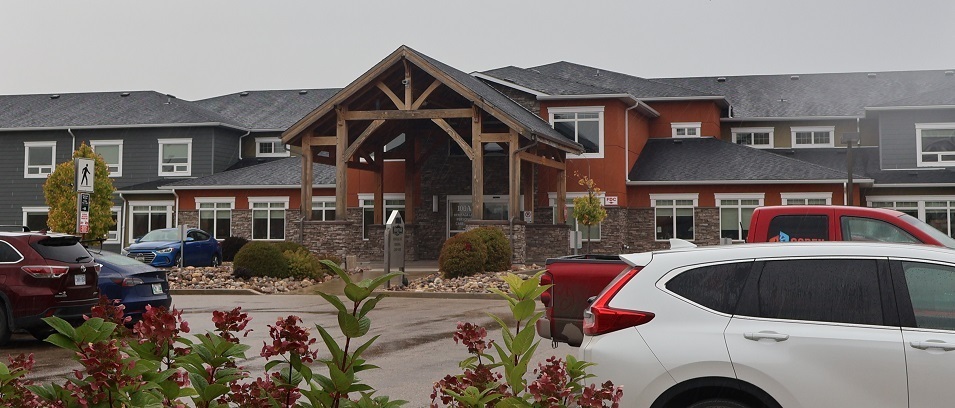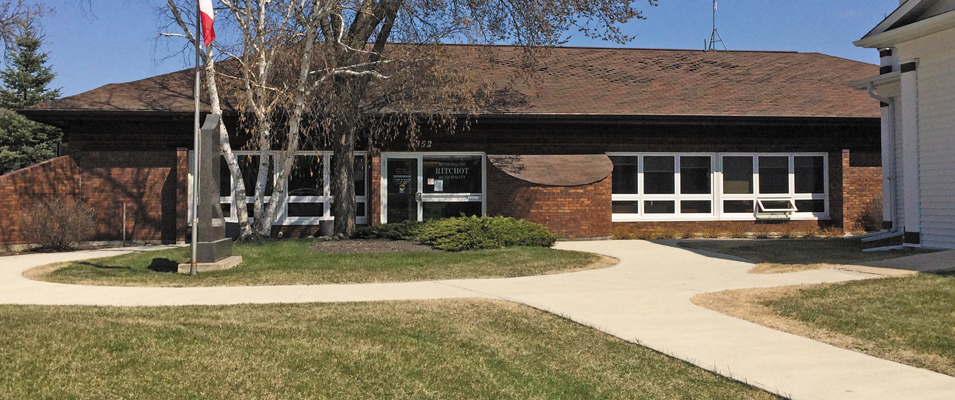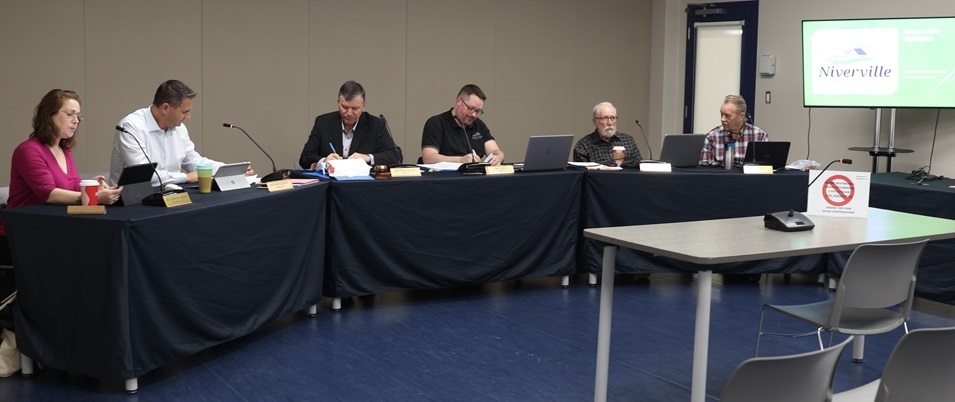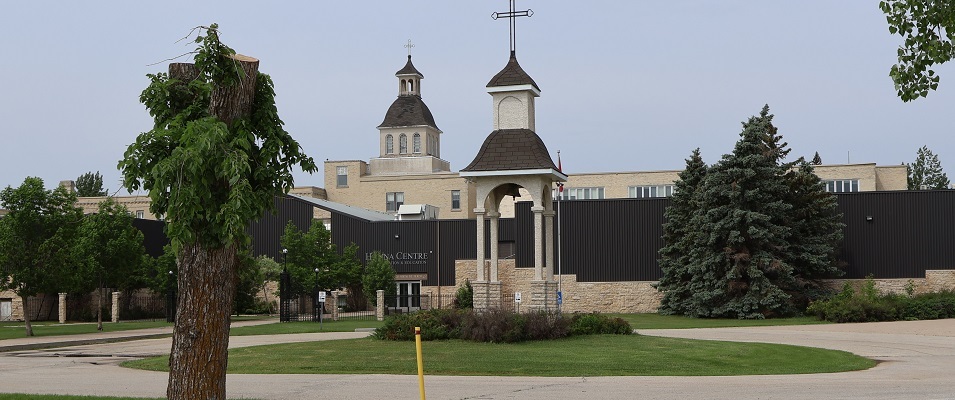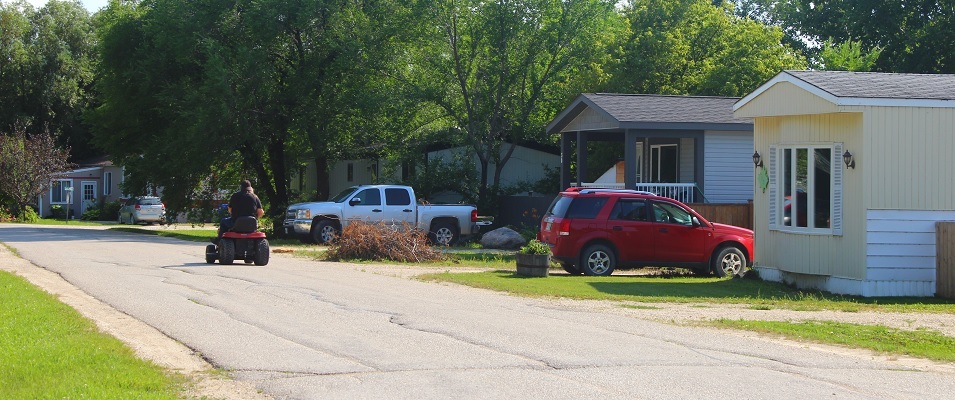
It may be difficult to believe that a neighbourhood in our corner of southeast Manitoba could be living under a regular boil water advisory (BWA) in 2022. But that’s exactly what residents of Southside Estates in Île-des-Chênes have been dealing with for the better part of 20 years.
Southside Estates is a mobile home park first established in 1979. According to park operator Ben Wiens, Southside is home to 115 mobile home lots.
Twelve of these lots are privately owned and serviced by the municipal water system. The remaining 103 lots are rented on a month-to-month basis to residents who have purchased the trailer that sits on them.
All of the rental lots rely on an onsite well for their water. From the well, water is pumped through a small treatment plant also located onsite.
From January through June of 2022, residents on the well system have been subject to a BWA. After a short reprieve in July, the BWA went back into effect on August 3.
“It truly is disappointing to me as an operator to see a system go under a boil water advisory so frequently,” Wiens says.
Resident’s Frustration
Tracey Wheeler has been a resident of Southside for the past eight years. A single mom with two kids in the household, she says she’s tired of the perpetual cycle of BWAs in the park. She says they’ve been going on for as long as she’s lived there.
“Nobody told me when I moved in that there were boil water advisories [in effect],” Wheeler says. “I had to find that out from my neighbours.”
She’s not surprised that the seller of her mobile home never mentioned it, pointing out that no one would buy a trailer in the park if they knew about the constant BWAs. She fears that selling her trailer would be an impossibility, too, if she were to disclose the truth to potential buyers.
“It’s frustrating to no end,” she says. “You can’t brush your teeth with the [tap water] and you can’t cook with it. If you have [little kids], you can’t even bathe them in the water. I think our [greater] community needs to know what’s going on. Boil water advisories don’t just affect reserves… It’s happening in our own backyard.”
The lease agreement she signed with the owner/landlord of the park clearly states that water is one of the amenities to be included in her monthly rent rate. Thus, she feels taken advantage of that she can’t rely on the availability of safe water.
“We have to go out and buy water even though we’re paying for it with our rent,” Wheeler says. “In the last eight years, they have given us two $20 store credits [to buy water.]”
For Wheeler, whose children are teenagers, water purchases during a BWA amount to about eight five-litre jugs per month. When you have BWAs lasting six months, that cost adds up quickly.
But the BWAs are only one part of her frustration. She’s also fed up with the frequency of water shutoffs to the majority of the park when repairs to the water system are being performed. When this happens, it’s not uncommon to get only a few hours’ notice. Sometimes, she says, she’s gotten no notice at all.
She recalls the water being off for three days last November. Her family couldn’t flush the toilet, take a shower, wash the dishes, or do a load of laundry during that time. Again, in April 2022, Wheeler returned home after a brief hospital stay only to find herself without water once more.
Explaining the Water Issues
Ben Wiens says that he’s the certified water utility operator hired to manage the treatment plant, pump system, and network of lines and valves that service the majority of the park. He’s also the son of Kathryn Wiens, an owner of Southside Estates, and he’s a brother to Jessie Cahill, the park’s office administrator.
According to Wiens, Wheeler’s claims as to the frequency of BWAs in the park are true.
Regarding the six-month BWA that occurred this year, he says, “We had an influx of water [line] breaks since January and there were so many breaks so close to each other that it wasn’t a good idea to rescind the BWA [in between repairs].”
Wiens adds that none of the BWAs which have occurred under his watch have been a result of unsafe drinking water. On the contrary, the water quality from the well is second to none, in his opinion.
The problem, he concludes, is the aging water distribution system of lines and valves, much of which is still the original infrastructure which was installed more than 40 years ago. Each time he needs to depressurize the water system to perform repairs to leaks, he says he’s required to contact Manitoba Health and ask for a BWA to be issued.
It’s a precautionary measure only, Wiens adds. Unfortunately, it’s a process that takes time, requiring him to send water samples to a third-party lab once the leak is repaired and wait for the report to pass through a string of officers before a rescind notice is issued to the residents informing them that the water is safe to drink.
When a water shutoff is required, he says they try and get messages out in as timely a manner as possible. These go out by email, Facebook, or phone calls.
“If we can’t give notice because the issue at hand is very, very critical, then we don’t,” Wiens says. “But we try to give notice as much as we can.”
The History of Southside’s Water System
Living with BWAs at Southside Estates has become the norm for as long as Wiens can remember.
The first one was issued in 2001 when Wiens’s father held ownership of the park. That BWA followed on the heels of the water crisis in Walkerton, Ontario in 2000, a tragedy that caused six deaths and 2,000 others to become ill due to deadly E. coli bacteria which had infiltrated the community’s drinking water supply.
The Walkerton situation garnered national attention and created big changes to water supply regulations.
“[Upgrading equipment] was so expensive back in 2001 that it was [a decision made to] go on a boil water advisory until technology was cheap enough,” recalls Wiens, who was 11 at the time. “[It’s either residents] can stay or we can spend a million dollars and go bankrupt and everyone’s going to have to move. So it’s kind of been a sustainability issue from the beginning.”
According to Wiens, that BWA lasted until 2014—a total of 13 years. By that time, Wiens had been actively working alongside his father in trailer park management, especially in the field of water management.
The pair were able to make some occasional tweaks to the system to have the BWA rescinded for a few months here and there over the course of the coming years. But, mostly, the BWA remained in effect until 2018.
Between 2015 and 2018, Wiens says they were finally in a position to spend the money needed to upgrade the water treatment plant. He’s proud of the upgraded facility, which operates on relatively current technology that uses ultraviolet light to disinfect the water that comes from the well. It’s also augmented by a digitized chlorination system.
There are sensors to detect air leaks in the system and an alarm which notifies Wiens of problems and their locations. The cost of the plant upgrade, he says, came to about $80,000.
“[The treatment plant has] come a long way since 2001,” Wiens says. “It’s actually pretty much been rebuilt completely.”
Unfortunately, Wiens lost his father tragically in the past few years. He has since taken on responsibility for picking up where his father left off. Wiens attained his Small Water Treatment Plant certification at Red River Polytechnic and manages the water system in the park solo.
He admits that he could use some backup since water quality testing is a daily requirement of being a plant operator. It means he’s on-call 24 hours a day, seven days a week. Indeed, it also means that, if for any reason he would be unable to attend to daily water checks, the park would have to go under a BWA until his return.
Following the recent upgrades to the plant, Wiens says that the park enjoyed about two years without a BWA, from 2018 to 2020.
Since that time, the rest of the water distribution system has been showing its age.
While about 25 percent of the service lines have been replaced since 2012, there is still a long way to go, Wiens concludes. Leaks in the old service lines and valves appear regularly to this day, which keeps the BWAs in an on-again, off-again rotation.
What Are the Options?
“[I’ve] learned a lot from the trailer park and all the problems that it has,” Wiens says. “I’ve learned so much there that I could run a small little town myself.”
That said, apart from a complete renewal of the underground distribution system, he feels the park would benefit from a secondary backup treatment plant and curb stops placed at the entry to every bay.
With curb stops in place, Wiens could localize the depressurized water and BWAs to only one bay at a time, instead of affecting the entire park, as it does now.
Of course, there’s also the option of connecting the entire trailer park to the existing municipal water system like the balance of Île-des-Chênes. For Wiens, this is not a cost-effective alternative.
Any way Wiens looks at it, park management has only two options: find a way to finance the great expense of a complete renewal or continue doing what they’re doing. It’s a catch-22, he admits, deciding whether tenants should pay more money or go on dealing with water problems indefinitely.
Current rent for each tenant is $240 per month. Aside from water, this rate also covers the tenants’ municipal sewer costs, property taxes, snow-clearing, and garbage removal.
“So when you’re only pulling in $2,880 a year for rent [per lot] and then you have to clear the roads and pay for garbage pickup and everything, [that’s not easy],” Wiens says.
Wiens adds that management prides itself on the fact that they are one of the cheapest trailer parks in which to live in Manitoba right now.
In the meantime, Wiens will be searching government websites, looking for grant monies that could assist with infrastructure renewal.
Others Weigh In
A shareholder in the business of Southland Estates, Kathryn Wiens, acknowledges that the park is not without problems. Even so, she says, they’re a small family-run business faced with rising costs and tough economic times just like everyone else.
“I’m just so happy that there are so many [tenants] that are patient with us,” Kathryn says. “It’s not like we’re [creating] the water line breaks. We just have to fix them when they come.”
A major inhibitor, she says, is the Residential Tenancy Branch (RTB), which puts tight restrictions on her as a landlord in terms of raising rent in any significant way. As a matter of fact, for the years 2022 and 2023 the RTB has set the allowable annual rent increase to zero percent.
“We’re not trying to harm our tenants,” Kathryn says. “It’s the Tenancy Branch that’s holding everything up. Everything we do there, we lose money all the time because we can’t raise the rent.”
The possible loophole for Southside Estates within RTB regulation may be a clause called the Rehabilitation Scheme. The scheme provides opportunity for landlords to apply to make significant changes to their rental property. If RTB approves the changes, and changes are carried out adequately, it affords the landlord flexibility in adjusting rent rates during an exemption period.
“An exemption period is the amount of time a rental unit may be exempt from rent regulation,” states the RTB website. “If your unit is exempt from rent regulation, it means that… your landlord can increase your rent, once every twelve months, by an amount they choose. They do not have to follow the rent increase guideline that the government sets each year. The length of the exemption period depends on how much money your landlord spends on their rehabilitation scheme.”
Even with options such as this, Kathryn is sympathetic to the financial hardships it could cause her tenants.
“It’s mostly senior citizens and single parents that live in there and they can’t afford to [pay higher rent],” she concludes.
Jessie Cahill, office manager for Southside Estates and Kathryn’s daughter, agrees that tenants may just need to be patient a while longer.
“We’ve been working really hard with Public Health,” Cahill says. “It’s just been a really unfortunate series of events with the harsh winter breaking some of our pipes. Out of 110 residents, most people have been super supportive and very thankful for our efforts.”
The Citizen reached out to municipal leadership, inquiring into council’s responsibility when it comes to residents of the RM who are living under long-term BWAs.
Ritchot Mayor Chris Ewen and Île-des-Chênes Councillor Shane Pelletier agree that it’s a problem they don’t like to see, but rectifying it is out of council’s control.
“I encourage residents of the trailer court to contact the owner/operator of the facility and encourage them to become part of the municipal infrastructure,” Ewen simply states.
Another Resident, Another Frustration
Patrick Poirier has been a resident of Southside Estates along with his two sons for the past four years. He echoes all of Wheeler’s frustrations, as well as one more: the lack of a private water shutoff valve to his mobile home.
For the first time since he purchased his trailer, Poirier experienced a major faucet leak at one of his sinks. As a plumber, Poirier saw it as a simple enough repair once the water shutoff valve was located and turned off.
He crawled beneath the trailer and located the connection where the park’s water line entered his trailer, but there was no shutoff valve. Thinking this impossible, based on years of experience, he searched the entire area beneath his trailer and confirmed his suspicions: there was no way to turn off the water to his trailer without turning it off to the entire park.
He says he reached out to Wiens for help but was simply told the valve was there and he should keep looking. Outreach to Southside management, he says, resulted in a curt response: “Call a plumber.”
“I don’t have a service valve under there,” Poirier says. “There’s a possibility that there is in other [trailers], but I know for a fact that I don’t have one.”
Like Wheeler, Poirier is frustrated with the continual leaks and questions the integrity of the lines running throughout the park. Without question, he says, the problems are always worst at the end of the winter season.
“What kind of water lines do they have in there that are shattering and rupturing?” Poirier asks. “Why are they not below the frostline?”
He says no one has ever made the effort to ask him whether a rent increase would be worthwhile in order to have a reliable water system.
“I have no problems paying a little more money if [it meant] having potable water all the time,” Poirier concludes. “Instead they’re just bandaiding it. They’re not remedying it.”
Wiens agrees that much of the breakage to lines and valves happens during times of extreme temperature fluctuation. He says tenants could help prevent some of it by ensuring that the skirt around the bottom of their trailer is intact and special heat sources called traces are attached to the lines beneath the trailer to keep the water from freezing.
A Resident Defends Owners’ Position
A third resident of the trailer park reached out to The Citizen in order to speak from a position of support for the owners’ noncommittal approach to ending the BWAs. She chooses to remain anonymous but says there are many other residents who feel the same way she does.
“It’s affordable,” she says. “And I can’t afford to live anywhere else.”
She’s been a resident of Southside Estates for the past 21 years and hopes to continue living here for years to come because it’s a safe community to live in.
The BWA was in effect two decades ago when she first bought in and she’s been buying drinking water ever since. It’s a small price to pay, she says, for affordable housing.
“When it comes down to it, yes, the BWAs and the water shutoffs are inconvenient, but that problem exists in all of Manitoba,” she adds. “Because the trailer park is old, obviously there’s going to be plumbing issues.”
She worries that some residents will try to force the owners’ hand to end the BWAs. If they are successful, she imagines the owners will have only two options: to sell the park or close it altogether.
“For a lot of us, we don’t have anywhere else to go,” she concludes. “And I’m afraid that we could possibly lose our home. I hope it doesn’t come to that, but this is my biggest worry.”
Temporary Relief
As of August 9, the BWA has been rescinded in the park again.
“I expect things will be good until wintertime now,” Wiens says.
The Citizen reached out to the media spokesperson for RTB, inquiring into a tenant’s rights in terms of ongoing water issues. As of this writing, no response had been received.





